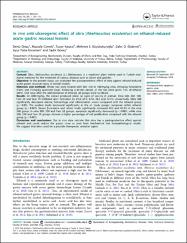| dc.contributor.author | Ortac, Deniz | |
| dc.contributor.author | Cemek, Mustafa | |
| dc.contributor.author | Karaca, Turan | |
| dc.contributor.author | Büyükokuroğlu, Mehmet E. | |
| dc.contributor.author | Özdemir, Zafer O. | |
| dc.contributor.author | Kocaman, Ayşe Tuba | |
| dc.contributor.author | Gönes, Sadık | |
| dc.date.accessioned | 2021-12-12T17:01:14Z | |
| dc.date.available | 2021-12-12T17:01:14Z | |
| dc.date.issued | 2018 | |
| dc.identifier.issn | 1388-0209 | |
| dc.identifier.issn | 1744-5116 | |
| dc.identifier.uri | https://doi.org/10.1080/13880209.2018.1442481 | |
| dc.identifier.uri | https://hdl.handle.net/20.500.11857/3124 | |
| dc.description.abstract | Context: Okra, Abelmoschus esculentus (L.) (Malvaceae), is a medicinal plant widely used in Turkish traditional medicine for the treatment of various diseases such as ulcers and gastritis. Objective: In the present study, we evaluated the gastroprotective effect of okra against ethanol-induced acute gastric mucosal injury in animal models. Materials and methods: Wistar rats were treated with 500, 250 or 100 mg/kg okra; 20 mg/kg famotidine (Fam); and 75 mg/kg quercetin (Que). Following a 60 min period, all the rats were given 1 mL of ethanol (80%). One hour after the administration of ethanol, all groups were sacrificed. Results: At 5000 mg/kg, the extract produced (okra) no signs of toxicity in animals. Okra 500, 250, 100, Fam 20 and Que 75 inhibited ulcer formation by 81.0, 67.5, 67.0, 76.3 and 72.4%, respectively. Okra 500 significantly decreased edema, hemorrhage and inflammation scores compared with the ethanol group (p < 0.05). The oxidant levels decreased significantly in the all study groups compared within ethanol group (p < 0.001). Serum beta-carotene and retinol levels significantly increased 40.2 and 45.4% in the okra 500 group. In okra 500, 250 and Fam 20 groups, apoptosis significantly decreased (p < 0.001), while okra 500, 250 and Fam 20 groups showed a higher percentage of cell proliferation compared with the ethanol group (p < 0.001). Discussion and conclusions: Our in vivo data indicate that okra has a gastroprotective effect against ethanol and could reduce the gastric ulcer as seen from biochemical and histopathological results. We suggest that okra could be a possible therapeutic antiulcer agent. | en_US |
| dc.description.sponsorship | Yildiz Technical University research fund [2015-07-04-KAP02] | en_US |
| dc.description.sponsorship | This study was supported by grants from the Yildiz Technical University research fund [2015-07-04-KAP02]. | en_US |
| dc.language.iso | eng | en_US |
| dc.publisher | Taylor & Francis Ltd | en_US |
| dc.relation.ispartof | Pharmaceutical Biology | en_US |
| dc.identifier.doi | 10.1080/13880209.2018.1442481 | |
| dc.rights | info:eu-repo/semantics/openAccess | en_US |
| dc.subject | Gastroprotection | en_US |
| dc.subject | apoptosis | en_US |
| dc.subject | gastric ulcer | en_US |
| dc.subject | immunohistochemistry | en_US |
| dc.subject | ulcer index | en_US |
| dc.subject | ulcer inhibition | en_US |
| dc.title | In vivo anti-ulcerogenic effect of okra (Abelmoschus esculentus) on ethanol-induced acute gastric mucosal lesions | en_US |
| dc.type | article | |
| dc.authorid | Ozdemir, Zafer Omer/0000-0002-8362-3136 | |
| dc.authorid | KARACA, Turan/0000-0002-2500-7781 | |
| dc.department | Fakülteler, Fen-Edebiyat Fakültesi, Türk Dili ve Edebiyatı Bölümü | |
| dc.identifier.volume | 56 | en_US |
| dc.identifier.startpage | 165 | en_US |
| dc.identifier.issue | 1 | en_US |
| dc.identifier.endpage | 175 | en_US |
| dc.relation.publicationcategory | Makale - Uluslararası Hakemli Dergi - Kurum Öğretim Elemanı | en_US |
| dc.authorscopusid | 56755434200 | |
| dc.authorscopusid | 55970945900 | |
| dc.authorscopusid | 22985194700 | |
| dc.authorscopusid | 6701489901 | |
| dc.authorscopusid | 36442724300 | |
| dc.authorscopusid | 57142305700 | |
| dc.authorscopusid | 57204139809 | |
| dc.identifier.wos | WOS:000426940500001 | en_US |
| dc.identifier.scopus | 2-s2.0-85051635963 | en_US |
| dc.identifier.pmid | PubMed: 29513129 | en_US |
| dc.authorwosid | Ozdemir, Zafer Omer/C-1666-2013 | |
| dc.authorwosid | KARACA, Turan/ABD-6669-2020 | |



















